
Analytical and Bioanalytical Chemistry Research
metrics 2024
Fostering Collaboration in Chemical Research.
Introduction
Analytical and Bioanalytical Chemistry Research is an esteemed open-access journal published by the Iranian Chemical Society, dedicated to the advancement of knowledge in the fields of analytical chemistry, biochemistry, and spectroscopy. Since its inception in 2014, this journal has provided a platform for researchers, professionals, and students to publish and access high-quality research articles that contribute to the understanding of chemical analysis and bioanalytical methods. With an ISSN of 2383-093X and an open-access model that promotes global dissemination of findings, it ensures that innovative research reaches a broad audience. The journal has consolidated its presence in the scientific community, currently ranked in quartile Q4 for analytical chemistry, biochemistry, and spectroscopy as of 2023. Its Scopus rankings, including a percentile of 34th in Analytical Chemistry, reflect its commitment to quality research and scholarly contribution. Situated in Tehran, Iran, the journal serves as a vital resource for academic discourse, offering insights into emerging trends and methodologies in analytical and bioanalytical chemistry.
Metrics 2024
 0.23
0.23 1.10
1.10 1.20
1.20 15
15Metrics History
Rank 2024
Scopus
IF (Web Of Science)
JCI (Web Of Science)
Quartile History
Similar Journals
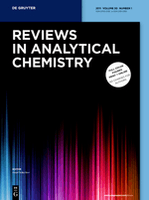
REVIEWS IN ANALYTICAL CHEMISTRY
Transforming Perspectives in Analytical ScienceREVIEWS IN ANALYTICAL CHEMISTRY, published by De Gruyter Poland Sp. z o.o., serves as a pivotal resource in the field of analytical chemistry, with a notable impact factor indicative of its scholarly significance. As an Open Access journal since 2020, it ensures widespread dissemination of high-quality research articles, facilitating knowledge sharing among researchers, professionals, and students alike. With its origins tracing back to 1980, the journal has adeptly adapted over the years to encompass emerging trends and innovations within analytical methodologies, maintaining its relevance and authority in the discipline. The journal is ranked in the Q2 category of analytical chemistry in 2023 and holds a commendable Scopus rank of #32 out of 156, reflecting its strong performance and the quality of the studies published. Researchers looking for cutting-edge reviews and insights will find this journal an invaluable platform for advancing their knowledge and research in analytical chemistry.
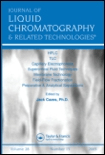
JOURNAL OF LIQUID CHROMATOGRAPHY & RELATED TECHNOLOGIES
Advancing the Frontiers of Chromatographic ResearchJOURNAL OF LIQUID CHROMATOGRAPHY & RELATED TECHNOLOGIES, published by Taylor & Francis Inc, is a pivotal platform for disseminating cutting-edge research in the field of liquid chromatography and its applications across various disciplines including analytical chemistry, biochemistry, and pharmaceutical science. With an ISSN of 1082-6076 and an E-ISSN of 1520-572X, this journal serves as an essential resource for researchers, professionals, and students committed to advancing the understanding and development of chromatographic techniques. Despite not being an open access publication, the journal features a robust submission process from 1996 to 2024, ensuring comprehensive coverage of historical and contemporary methodologies. Notably, it has achieved rankings in the Q3 and Q4 quartiles across various categories, reflecting its reputable position in the field. It’s recognized within key databases, with Scopus ranks indicating its influential role in areas such as pharmaceutical science and analytical chemistry. This journal is not only a cornerstone for specialized studies but also fosters interdisciplinary collaborations, making it an invaluable asset for the scientific community.

MICROCHEMICAL JOURNAL
Elevating Research Standards in Microchemical ScienceMicrochemical Journal, published by Elsevier, stands as a leading scholarly publication in the fields of Analytical Chemistry and Spectroscopy, boasting impressive rankings of Q1 and Q2 in their respective categories for 2023. With an H-index reflecting its substantial impact and relevance, this journal has been a cornerstone of research dissemination since its inception in 1957, and it continues to play a vital role in advancing the methodological and technological innovations within these disciplines. The journal presents peer-reviewed articles that explore a wide array of topics, making it an essential resource for researchers, professionals, and students keen on the latest advancements in microchemical processes and techniques. Although it does not currently offer open access options, its publication through Elsevier ensures a high standard of academic integrity and wide accessibility through various academic institutions. With a strong Scopus ranking—9th in Chemistry Spectroscopy and 22nd in Analytical Chemistry—Microchemical Journal is an indispensable platform for empirical studies, insightful reviews, and pioneering methodologies in the microchemical domain.
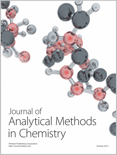
Journal of Analytical Methods in Chemistry
Fostering collaboration in the vibrant world of analytical science.The Journal of Analytical Methods in Chemistry, published by HINDAWI LTD, stands as a premier platform dedicated to the dissemination of research in the vibrant field of analytical chemistry. With an ISSN of 2090-8865 and an E-ISSN of 2090-8873, this Open Access journal has been committed to providing unrestricted access to quality research since 1978, thereby fostering greater collaboration and innovation among researchers, professionals, and students globally. The journal showcases rigorous research insights spanning diverse categories, earning impressive Scopus rankings including Q2 in Chemical Engineering and Q3 in Analytical Chemistry for 2023, positioning itself effectively among respected peers. Its interdisciplinary approach also covers significant contributions in the realms of instrumentation and computer science applications, thus addressing contemporary challenges and advancements in analytical methodologies. By bridging theoretical underpinnings with practical applications, the Journal of Analytical Methods in Chemistry aims to catalyze knowledge exchange while enhancing the global discourse in analytical science.
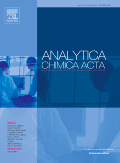
Analytica Chimica Acta
Elevating the discourse in spectroscopy and biochemistry.Analytica Chimica Acta is a prestigious peer-reviewed journal published by ELSEVIER, renowned for its significant contribution to the fields of analytical chemistry, biochemistry, environmental chemistry, and spectroscopy. Established in 1947, this journal has solidified its reputation, reflected in its impressive impact factors and Scopus rankings, including a Q1 classification in Analytical Chemistry and Spectroscopy, and a Q2 ranking in both Biochemistry and Environmental Chemistry. With its comprehensive scope, Analytica Chimica Acta aims to publish innovative research, critical reviews, and technical notes that advance the understanding and application of analytical methods. As an essential resource for researchers, professionals, and students alike, it encourages the dissemination of high-quality research that addresses contemporary challenges in chemical analysis and promotes interdisciplinary collaboration. While the journal operates primarily on a subscription basis, it also offers unique opportunities for authors to reach a broad audience and engage in the global scientific discourse.

Methods and Objects of Chemical Analysis
Advancing the Frontiers of Analytical ChemistryMethods and Objects of Chemical Analysis is a significant outlet in the field of Analytical Chemistry, published by the prestigious TARAS SHEVCHENKO NATIONAL UNIVERSITY OF KYIV in Ukraine. Since its inception in 2017, this journal has aimed to advance methodological and analytical understanding within the discipline, addressing contemporary issues and innovative techniques. With a Scopus rank of #133 out of 156 and a Q4 Category Quartile for 2023, it offers a platform for researchers and professionals to disseminate crucial findings and methodologies. While currently serving as a traditional journal, it is fostering an academic community focused on impactful research that enhances our understanding of chemical analysis techniques. The journal’s commitment to scholarly rigor and its relevance in a rapidly evolving field make it a valuable resource for students and seasoned researchers alike, seeking to remain at the forefront of analytical advancements.
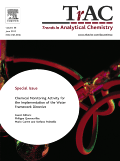
TRAC-TRENDS IN ANALYTICAL CHEMISTRY
Advancing Knowledge in Analytical ChemistryTRAC - Trends in Analytical Chemistry is a prestigious journal published by Elsevier Science Ltd, situated in the Netherlands. With an impressive impact factor reflected in its Q1 rankings across three major categories—Analytical Chemistry, Environmental Chemistry, and Spectroscopy—this journal stands at the forefront of disseminating pioneering research and advancements in the field of analytical chemistry. Established in 1981, TRAC provides a comprehensive platform for researchers to share influential studies and insights related to the latest trends, methodologies, and technologies in analytical techniques. Recognized globally, the journal excels in fostering cross-disciplinary dialogue and innovation, making it an indispensable resource for academics, professionals, and students alike. Explore the latest issues to stay abreast of cutting-edge developments that shape the analytical sciences.

Brazilian Journal of Analytical Chemistry
Advancing Analytical Insights in Latin AmericaBrazilian Journal of Analytical Chemistry, published by VISAO FOKKA COMMUNICATION AGENCY, serves as a vital platform for those engaged in the field of analytical chemistry, especially within the Latin American context. With an ISSN of 2179-3425 and an E-ISSN of 2179-3433, this journal aims to promote high-quality research and advancements in analytical methodologies, instrumentation, and applications spanning from 2010 to the present. Although it currently holds a Q4 rank in Analytical Chemistry by Scopus and is placed at the 24th percentile, its commitment to open access publishing provides invaluable opportunities for widespread dissemination of knowledge, catering to researchers, professionals, and students alike. The journal's editorial board comprises emerging and established experts aiming to bridge gaps in analytical chemistry research, particularly in a Brazilian and broader South American context. Situated in São Paulo, Brazil, the journal's role in fostering innovation and collaboration in analytical techniques makes it an essential resource for the academic community.

TALANTA
Unveiling Breakthroughs in Analytical ScienceTALANTA, published by Elsevier, is a premier international journal that serves as a vital platform in the field of analytical chemistry. Since its inception in 1958, TALANTA has provided a comprehensive forum for the dissemination of groundbreaking research and developments in chemical analysis, spanning a wide array of topics including biochemistry and spectroscopy. With an impressive impact factor and ranking in the Q1 quartile within its category for 2023, it is ranked #12 out of 156 journals in Analytical Chemistry by Scopus, placing it among the most influential journals in its field. Researchers, professionals, and students benefit from its stringent peer-review process and high-quality content that drives advancements in analytical methodologies and applications. TALANTA's commitment to fostering innovation and excellence in research makes it an indispensable resource for anyone at the forefront of scientific inquiry.

CHEMICAL RESEARCH IN CHINESE UNIVERSITIES
Elevating Standards in Chemical ScholarshipCHEMICAL RESEARCH IN CHINESE UNIVERSITIES is a prominent academic journal dedicated to the dissemination of high-quality research in the field of chemistry and related educational methodologies. Published by HIGHER EDUCATION PRESS, this journal has established itself as a vital resource for researchers and professionals looking to stay at the forefront of chemical sciences. With an impressive impact factor and ranked in the Q2 quartile for both Chemistry and Education categories, it highlights significant advancements while maintaining rigorous peer-review standards. The journal's ISSN is 1005-9040 and its E-ISSN is 2210-3171, ensuring broad accessibility to its global readership. Although it does not offer open access, its contributions are vital to understanding the dynamics of chemistry research and education within and beyond China. With converged publication years from 1999 through to 2024, CHEMICAL RESEARCH IN CHINESE UNIVERSITIES continues to be an essential platform for innovative studies and critical discussions in the expanding realm of chemistry.